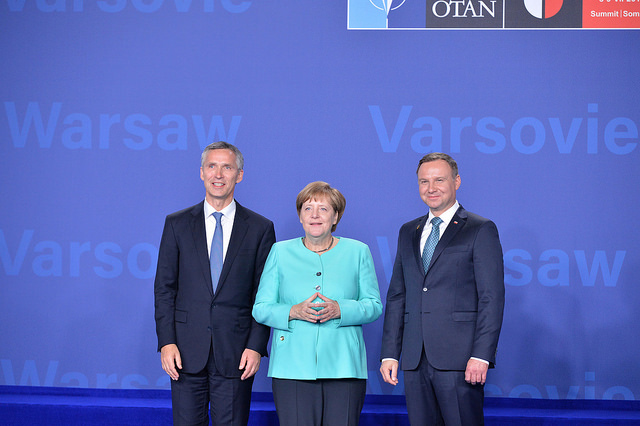 [German Foreign Minister Frank-Walter] Steinmeier rightfully describes how Germany has already come a long way in its foreign policy.
[German Foreign Minister Frank-Walter] Steinmeier rightfully describes how Germany has already come a long way in its foreign policy.
He lists Germany’s leadership in the negotiations over the Iranian nuclear program, its active military engagement in Kosovo and Afghanistan, its unusual exposure after the Ukraine crisis, and its firm course in the eurozone and refugee crises….
Not for everyone is Germany’s restraint and lack of foreign policy ambition a virtue. For many observers, it is either an attempt to shun responsibility (which I think it is not) or a sign of Germany’s unresolved ego disturbance when facing power and force, the raw materials of foreign policy. On that last point they are right, unfortunately.
Steinmeier’s text illustrates the continuous soul-searching of a still historically traumatized society. That the trauma still exists is no surprise. Historically speaking, very little time has passed since Germany committed both genocide and moral suicide between 1933 and 1945. The problem is not that the trauma continues. The problem is that dealing with it takes lots and lots of time but a world has emerged outside Germany that does not grant the country the time to come to grips with its demons before engaging more….
From that obsession with Iraq stems Steinmeier’s biggest mistake in the text. He reduces military engagement to intervention. But the problem with Germany’s restraint on military affairs has very little these days to do with its reluctance to deploy to the far corners of the planet. It has a lot more to do with Germany’s role in reassurance and deterrence on NATO territory.
Germany’s military continues to be starkly underfunded, despite a slight increase in spending. Germany forces NATO to call an alliance exercise a Polish exercise because it fears that Russia could be provoked, when in reality the provocations are Russian. Steinmeier equates the very moderate response to Russia’s continued intrusions and aggressions on NATO’s Eastern flank with “saber rattling and war mongering,” sending shock waves through NATO (and the German Chancellery, too). He embraces a version of Ostpolitik that never mentions the fact that Germany’s previous Eastern détente was built on massive military strength, not just good intentions. No wonder Germany’s reliability as an ally is questioned.
Germany’s attitude toward the use of force remains the litmus test of its foreign policy maturity, no matter how tired the Berlin elites are of hearing this argument. In the end, Steinmeier’s efforts only highlight the size of the problem. His tragedy is that he wants the right thing but avoids calling a spade a spade. But truth avoidance will neither heal the wounds nor produce good policy. It never helps the patient in therapy. Most importantly, it won’t keep Europe and Germany safe at a time when that security is more brittle than at any moment in the last quarter century.
Jan Techau is the director of Carnegie Europe, the European center of the Carnegie Endowment for International Peace.
Image: Secretary General Jens Stoltenberg, German Chancellor Angela Merkel, and Polish President Andrzej Duda, July 8, 2016 (photo: NATO)
